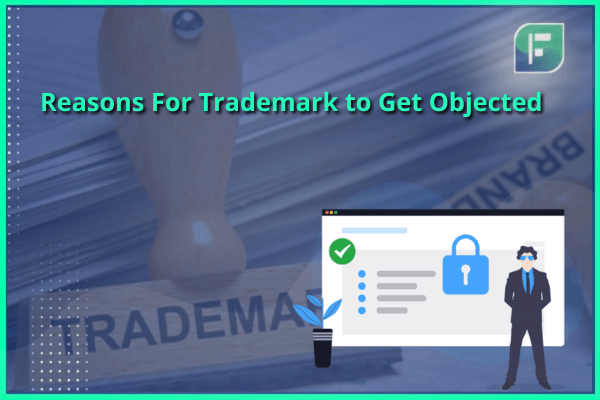The establishment of a trademark serves the purpose of crafting a distinct identity for a brand, setting it apart from other products or services within the market. However, the assertion of your trademark rights may encounter opposition or objection from external parties. To deal with this aspect effectively, it becomes essential to comprehend the concept of objection in trademark registration matters and the underlying reasons for its occurrence. In this blog, we shall see the reasons for trademark to get objected.
Understanding Trademark Objection
A trademarks objection occur when concerns about the registration of a trademark has been raised by a trademark examiner, a member of the public, or some third party.
Government Examiner’s Objections
The government trademark examiner can object to a trademark registration application for 2 reasons:
1. Incomplete or Incorrect Information: The examiner might ask for more details or explanations about the mark to spot any mistakes or missing information in the application.
2. Similar Trademarks Exist: If there’s already a trademark that looks a lot like the one being examined, the examiner could raise concerns about potential confusion in the market.
Objections by Third Parties/Public Interest
Also, with the government objections, third parties or the public can file objections in the public interest. This occurs under these circumstances:
1. Listing in the Trademark Gazette: Once the trademark is featured in the trademark gazette, it is accessible for public review.
2. Employing the Trademark Pre-Registration: In the event the trademark is utilized, particularly before obtaining official registration, others may express reservations to protect their vested interests.
Any dissent should be submitted within a span of four months, and the reasons for the dissent should be distinctly stated.
Handling Trademark Objections
Upon raising an objection, the application status changes to ‘Opposed.’ In the Indian trademark registry, a registered trademark facing objection will be marked as ‘Objected.’ The applicant or trademark user will receive a notice detailing the objection and the grounds for opposition. This notice serves as a formal communication to address and resolve the raised concerns in the trademark registration process.
Reasons for Trademark to Get Objected
There can be many reasons for trademark to get objected. Understanding these common grounds is essential for a smooth registration process. The major reasons for trademark to get objected are:
1. Incorrect Trademark Form (Form TM-1):
One of the reasons for trademark to get objected is if the application is not submitted on the correct form. The examiner’s statement may indicate that the application is made on Form TM-1 for a certification mark related to goods and services in a specific Trademark class. The correct form, TM-4, should be used, and a request for correction on TM-16 must be filed promptly.
2. Incorrect Trademark Applicant Name:
The name provided in the application must include all partners if applicable and should be filed in the name of a partnership firm. Corrections for this can be made by filing a request on TM-16.
3. Failure to File Trademark Form TM-48:
When a trademark registration is submitted by trademark agent, Form TM-48 also has to be filed along with it. This form serves as a letter authorising the agent or attorney. Failure to do so is among the reasons for trademark to get objected, which can be rectified by correcting the application with the submission of Form TM-16.
4. Incorrect Address on Trademark Application:
If the principal base of the applicant is not mentioned in the application, it becomes one of the reasons for trademark to get objected. The examiner’s statement would be, ‘The principal base of the applicant should be brought on record by filing a request on TM-16.’ The applicant should promptly correct this objection by filing the necessary request on TM-16.
5. Vague Specifications of Goods or Services:
Objections can arise if the application lists a large number of goods or services or if the descriptions are too vague. To address this, the applicant must file a request on TM-16 to provide specific details and clarify the items for which the trademark is sought.
6. Existence of Similar Trademark:
If a trademark show resemblances to already existing one, an objection can then be raised in accordance with section 11(1) of the Trade Marks Act.
7. Trademark Lacks Distinctive Character:
Trademarks lacking distinctive character may face objections. To overcome this, the applicant must provide evidence demonstrating the unique character of the trademark, typically through prior use.
8. Trademark Is Deceptive:
Objections may be raised if the trademark has the potential to deceive the public regarding its use, nature, or quality. In such cases, the applicant can file TM-16 to apply for an exemption of certain goods and services from the deceptive specification.
Addressing these objections in a timely and appropriate manner, through the filing of necessary forms and providing supporting evidence, is essential for a successful resolution of trademark-related issues.
Final Thoughts
There are various reasons for trademark to get objected during the registration process. Issues such as incorrect application forms, applicant details, and addresses, as well as vague specifications of goods or services, can prompt objections. Additionally, objections may arise due to the existence of similar trademarks, a lack of distinctive character, or the potential for deception. Resolving these objections often requires applicants to file requests on TM-16, providing clarifications, evidence of distinctiveness, or seeking exemptions. Successfully dealing with these challenges is crucial for achieving a smooth and effective trademark registration process.






